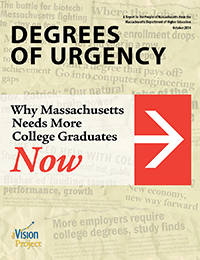Contact:
Katy Abel, Massachusetts Department of Higher Education
617-994-6932 (office) or 617-429-2026 (cell)
kabel@bhe.mass.edu
For Immediate Release
October 28, 2014
3rd “Vision Project” Report shows gains among Latino students; forecasts shortage of college graduates needed for key sector growth

BOSTON -- October 28, 2014 – At a time of rising demand for skilled college graduates in the Commonwealth, the Department of Higher Education’s third annual Vision Project report shows progress being made to raise graduation rates and close achievement gaps among public college and university students in Massachusetts, but also projects a shortage of skilled graduates needed to meet the needs of employers in key industry sectors that fuel economic growth, based on an expected drop in the state’s high school population in the coming years.
“The Vision Project report provides state leaders with a road map that allows us to think and respond proactively to the issues in higher education we will face in the next decade,” said Secretary of Education Matthew Malone.”At the same time it allows us to celebrate achievements by our campuses and by the Patrick Administration. There are many points of progress contained in this report, and I am proud that our public colleges and universities share a vision for the future.”
“Degrees of Urgency: Why Massachusetts Needs More College Graduates Now,” was released this morning before a group of 275 business and civic leaders gathered at the Boston Foundation. The report outlines system and campus-level achievements aligned with the Vision Project goal of leading nationally among state systems of public higher education.
Among the recent gains:
Along with citing progress,the report draws attention to a major challenge facing the Commonwealth: declining enrollments at public colleges and universities at a time when the state’s need for more college-educated workers has never been greater.
The report forecasts that by 2020, the system that now educates 70% of high school students who remain in state to attend college will be under-producing needed graduates by a minimum of 55,000 to 65,000, the result of enrollment declines that stem from a drop in the state’s high school population. Within six years, Massachusetts’ high school population will shrink by 9%, a shift from the previous decade which saw a 31% increase in the number of high school graduates. The prior growth helped fuel record enrollments at Massachusetts’ community colleges, state universities and UMass campuses, a boom which has now ended. This fall the public higher education system posted its first decline in enrollment in a decade.
“Today we put forth a major plan to address the state’s need for more college graduates,” said Richard M. Freeland, Commissioner of Higher Education. “This is vital work on behalf of the Commonwealth and we understand that we can only deliver the graduates Massachusetts needs if we are improving our overall academic performance, which campuses are striving to do, and if such efforts receive strong state support.”
At outlined by Commissioner Freeland at the Boston Foundation report release event, the “Big Three Completion Plan” to address the state’s need for more graduates focuses on 1) helping more students succeed in and complete college 2) redoubling efforts to close persistent achievement gaps that keep too many African American and Latino/a students from graduating, and 3) attracting and retaining students who are not being served by the system, including those who currently can’t afford to attend college, those who are choosing to attend college out of state, and adult students who need to finish their degrees.
Despite recent investments by the Patrick Administration, decades of insufficient funding to Massachusetts public higher education have resulted in the Commonwealth ranking no better than average (currently, 26th in the nation) in state support for its public colleges and universities. A report released Tuesday by the Commonwealth’s Higher Education Finance Commission recommended that the public campuses receive significant additional funding, $475 million over five years tied to performance improvement, and called for such support to be linked to campus efforts to achieve greater operating efficiencies.
“The strength of our state’s economy and the strength of our public colleges and universities are linked and therefore requires private sector and public sector leaders to work in collaboration,” said John Fish, Chairman and CEO of Suffolk Construction who served as a member on the Commission. “The recommendations in the commission’s report provide us with a set of guidance that will help Massachusetts build a workforce that can lead for decades to come.”
“The particular needs of this state, more than many other states, demand a first class system of public higher education,” said Charles F. Desmond, Chairman of the Massachusetts Board of Higher Education. “If we hope to reap the economic dividends that come from being an educational leader, Massachusetts must make academic excellence at its public colleges and universities an even higher priority than it is right now.”
“There is clear consensus, Massachusetts must have a national top tier public higher education system to compete in our 21st century economy,” said the Co-chairman of the Joint Committee on Higher Education, Representative Tom Sannicandro (D-Ashland.) “This means greater efficiency and collaboration on the part of our higher education institutions, and strategic investment on par with the states that lead the way in public higher education nationally. This effort will require support from every resident of our Commonwealth. We understand what must be done, and today we affirm the need to act.”
###